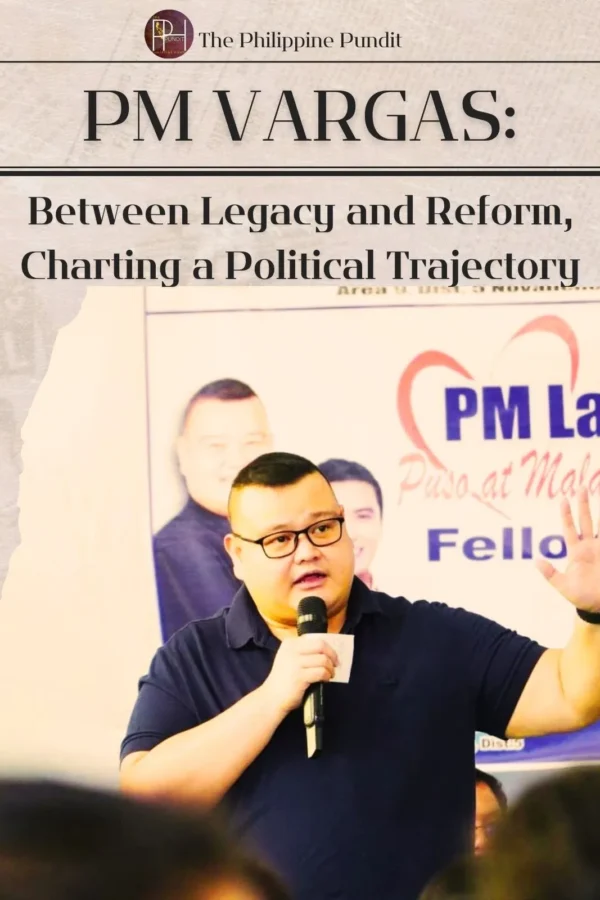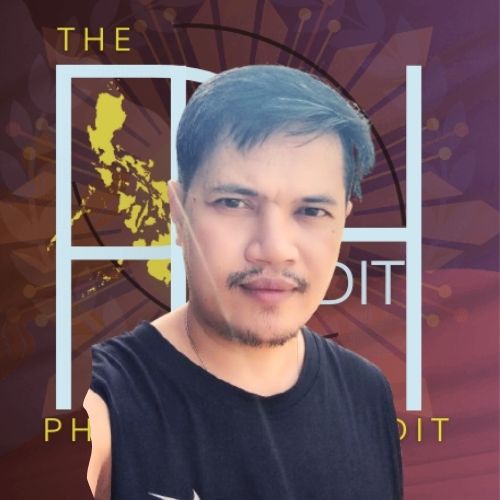🕓 Last Updated: June 4, 2025, 1:22 am (PH time)
Patrick Michael “PM” Vargas is a product of civic and political upbringing, having worked as the longtime chief of staff to his older brother and predecessor, former QC’s 5th District Rep. Alfred Vargas (Alfredo Paolo Dumlao Vargas III). Renowned for his introverted nature and technocratic work ethic, PM first worked behind the scenes, learning legislative ropes quietly.
With the dust having settled on the #Halalan2025, the 2025 midterm elections, Quezon City’s 5th District trusts once more in Patrick Michael “PM” Vargas, who gets re-elected for a fresh term at the House of Representatives. Although still stuck under the very long shadow of his brother, actor-politician Alfred Vargas, PM Vargas has gradually been making his own mark as a different, albeit wary, politician. This piece gets closer to this person behind the political surname—his origin, track record, and the path ahead.
🇵🇭 Quick Facts: PM Vargas
- Full Name: Patrick Michael Dumlao Vargas
- Nickname: PM
- Birthdate: January 27, 1982
- Education: AB Political Science, Ateneo de Manila University
- Previous Role: Chief of Staff to Rep. Alfred Vargas
- First Elected: 2022 – 18th Congress (QC 5th District)
- Current Term: Re-elected in 2025
- Focus Areas: Healthcare, Housing, Higher Education
- Political Party: PDP-Laban (2022), Lakas-CMD (2025–present)
- Constituency: 5th District, Quezon City
A Glimpse into His Roots: Personal and Educational Background
Patrick Michael Dumlao Vargas, or PM Vargas for short, comes from a family that combines showbiz glamour with public service. A Quezon City native, he was schooled at top universities, ultimately earning his political science degree from the Ateneo de Manila University. While his flamboyant brother Alfred took on the spotlight early on, PM has maintained a low-profile public image, preferring instead to dive into administrative and technical governance areas at the beginning of his political career.
Prior to becoming a legislator, PM Vargas worked behind the scenes as chief of staff to his brother Alfred for the latter’s three consecutive terms as congressman of the 5th District. This position gave PM a hands-on apprenticeship in local legislation, district planning, and constituency development.
From Backroom to Ballot: A Career Molded in Dynasty and Duty
When Alfred Vargas was precluded from running for a fourth term because of term limits in 2022, PM was the obvious heir, both in name and political equipment. Under the administration-aligned Partido Demokratiko Pilipino Lakas ng Bayan (PDPLBN) ticket then, PM swept to victory, perpetuating the Vargas brand’s hold on the district.
Since becoming a member of Congress, PM Vargas has worked on these legislative efforts that can be branded as the “3 Hs”: healthcare, housing, and higher education. Among his most prominent legislative agenda, projecting a ground-level impact with strategic vision, are
🏛️ Healthcare
- House Bill No. 6296: Creating a health center and lying-in clinic in Barangay Novaliches Proper, Quezon City;
- House Bill No. 4074: Granting a healthcare program for public school teachers;
- House Bill No. 6142: Providing safe drinking water by amending the Code on Sanitation of the Philippines (Senate Legislative Digital Resource).
🏠 Housing
- House Bill No. 5815: Creating a rental housing subsidy program for informal settler families.
🎓 Higher Education
- House Bill No. 4070: Increasing the minimum salary grade level of teachers;
- House Bill No. 4071: Creating a comprehensive training program for teachers of children with disabilities;
- House Bill No. 4073: Offering incentives to public school teachers assigned outside their cities, municipalities, and provinces (Senate Legislative Digital Resource).
Challenges and Opportunities for Stronger Leadership
His record has been challenged many times, although he appears to be improving. His critics often cited the following issues:
Dependence on Kinship
They asserted that PM Vargas did not acquire his seat of power through grassroots leadership but through dynastic succession. His ascendancy to the fore was facilitated by his brother, now QC’s 5th District Councilor Alfred Vargas, a veteran politician with three terms in Congress. Critics argue that his victory at the polls is an expression of the continuity of a political dynasty and not a mandate achieved on individual merit or mass movement.
Potential Course of Action:
- Create a distinct public image and platform. PM must declare independence by launching a policy agenda or advocacies that are clearly different from or superior to those of his predecessor.
- Build alliances outside of the family circle, especially among young adults, policy analysts, and civic society.
Does It Help Explain His Achievements?
Yes, in the short term. Voters are attracted to dynastic machinery and name recognition. But unless he creates a strong identity based on merit and not heredity, it might ultimately erode credibility.
Deficient in Bold Legislative Vision
In contrast to other new youthful legislators like Raoul Manuel or Sarah Elago (in their terms), PM’s legislative track record falls short of radical or disruptive reform bills. While PM Vargas has written and co-authored several bills, they are cautious, non-contentious, and on local demand. What is missing is visionary legislation—proposals that address root national concerns like political change, global warming, or educational innovation.
Potential Course of Action:
- Advocate a signature bill that solves a long-term national problem (e.g., Metro Manila urban sustainability, youth digital literacy, anti-political dynasty legislation).
- Work with reformist lawmakers or belong to policy caucuses (e.g., Makabayan bloc, minority youth caucuses) for legislative substance.
Does It Contribute to His Success?
Neutral at best. Playing it safe has made his record clean but unimpressive. Without boldness, his ceiling as a legislator or executive leader is low.
Transparency Issues
PM Vargas has been faulted for giving erroneous or belated public disclosure of public funds, particularly at the barangay level during project openings, though not being involved in any of the serious issues. PM is not under any credible corruption charges, but budgets, project costs, and performance metrics are often withheld from the public on a timely or accurate basis. Even if unintentional, this reinforces the idea that there is a lack of transparency.
Potential Course of Action:
- Establish an open digital transparency platform that tracks procurement activity, project funding, and development in the 5th District.
- Engage the media and local watchdogs on a regular basis through town hall meetings and accountability sessions.
Is It Useful for His Success?
Negatively affects long-term trust. Despite good performance, a lack of transparency can quickly destroy credibility in an era of civic consciousness and online activism.
Limited Opposition Participation
He has rarely taken strong stances on issues of national interest, usually choosing to side with administration narratives, apparently for the sake of funding continuity for his district. PM Vargas tends not to take hard stands on highly divisive national issues (e.g., red-tagging, Charter Change, West PH Sea, political dynasties), and this can be seen as political timidity or fence-sitting.
Potential Course of Action:
- State his position on at least three significant national concerns, particularly those affecting urban centers.
- Take risks responsibly by endorsing reforms or policies not necessarily in keeping with the administration, but in keeping with public interest.
Does It Lead to His Success?
Safe in the short term, stunted in the long term. Political neutrality may prevent controversy, but it also prevents him from leading movements or instilling change, crucial skills for upward mobility in politics.
Summary Table of Challenges and Opportunities
This table is meant to provide a fair, realistic evaluation of his weaknesses as a public servant and areas where public criticism or corrective action is warranted. This section isn’t attempting to unjustifiably criticize PM Vargas. Rather, it diagnoses weak points so constituents are more informed, allies can plan more effectively, and PM Vargas himself (or his staff) can make adjustments.
| CHALLENGE | SHORT-TERM IMPACT | LONG-TERM IMPACT | COURSE OF ACTION |
|---|---|---|---|
| Dependence on Kinship | Boosts vote retention | Limits credibility and growth | Define unique advocacy and identity |
| Deficient in Bold Legislative Vision | Keeps the record clean | Keeps the record clean | Champion a visionary, high-impact bill |
| Transparency Issues | Prevents conflict | Erodes public trust | Launch digital and participatory transparency tools |
| Limited Opposition Participation | Avoids backlash | Misses reformist potential | Take clear, strategic stands on national issues |
Charting the Road Ahead: What’s Next for PM Vargas?
PM Vargas’ political trajectory looks gingerly upwards. His leadership style—measured, technocratic, and conflict-avoiding—indicates ambitions for longer-term political survival. Based on his present visibility and low-key networking, various possibilities appear plausible:
✅ Short-term: If PM Vargas aligns himself more with administration caucuses, he has aspirations of becoming a House leader or chairman of committees.
✅ Medium-term: A possible bid for vice mayor or mayor of Quezon City—if the Vargas brand can continue to retain strong grassroots appeal.
✅ Long term: If they cultivate carefully, the Vargas brothers can establish themselves as powerful regional leaders, particularly if PM resists being seen as simply the successor to Alfred.
Nonetheless, to transcend being a dynastic fill-in, PM will need to adopt more daring legislative stances, develop a sharper ideological sense, and address urgent national concerns that resonate with younger, more skeptical voters.

Where This Leaves Us
PM Vargas is a narrative of political legacy forged into effective governance. Whether he becomes a reformist public servant or settles as a byproduct of dynastic succession rests not just on his strategic decisions but also on the extent to which his constituents critically continue to remind him of his accountability. In the perpetually complex reality of Philippine politics, PM Vargas’ future will tell if he merely inherits the top job—or earns it. ▲
💬 AI Use Disclosure: This is an AI technology-assisted article (ChatGPT, OpenAI). 👉 Learn more about our AI use.
Reference:
- House of Representatives of the Philippines. (2024). House Member Information – PM Vargas. Retrieved from https://www.congress.gov.ph
- Quezon City Government. (2023). Infrastructure and Social Services Reports. Quezon City LGU Archives.
- Vargas, A. & Vargas, P.M. (2022). District Accomplishment Report: QC 5th District. Quezon City Public Records.
- Commission on Elections (Comelec). (2025). Certified List of Elected Officials – Halalan 2025. Retrieved from https://www.comelec.gov.ph
- Rappler. (2023, June 10). PM Vargas pushes for Quezon City district hospital. Retrieved from https://www.rappler.com
- TESDA Quezon City. (2024). Skills Partnership Program Reports. Retrieved from TESDA Regional Office Files.
SEO Keywords: PM Vargas, Patrick Michael Vargas, Quezon City 5th District representative, Philippine political dynasties, local governance in Quezon City, 2025 midterm elections Philippines, Filipino youth in politics, district hospital bill QC, political career trajectory
The views and opinions expressed in this article are those of the author and do not necessarily reflect the official policy or position of any affiliated organization, employer, or institution. The author bears sole responsibility for the content.
📩 Subscribe to The Philippine Pundit
Stay updated with the latest news, insights, and stories. Join our mailing list today!

Regel Javines is the independent voice behind the Philippine Pundit. With roots in grassroots work and government service—from open-source research analysis with the Philippine Air Force and news desk duties at The Manila Times, to development and congressional assistance work at Congress—he brings unique insights shaped by philosophy, justice, and lived experience. His mission: to give voice to the unheard and raise questions that stir the soul.